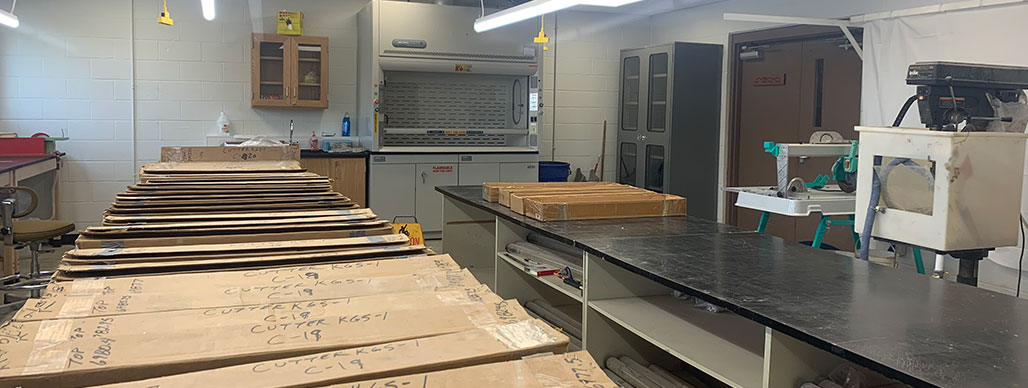KansCAL: The Kansas Core Analysis Laboratory
The Kansas Core Analysis Laboratory is operated as a service to the people and industry of Kansas providing routine and special core analysis to determine rock quality. A index of the Survey's core collection is available online.
What is rock quality?
Rock quality is an assessment of the value of a rock based on its measurable properties, like porosity, permeability, or chemistry. Industrial users of rocks include the oil and gas industry where the porosity and permeability of an underground reservoir determines how much oil a field might contain and how quickly it can be pumped out. For aggregates, the porosity or chemistry of a rock can determine how it reacts with cements (like Portland cement or asphalt) or how long it will last when exposed to weather in the natural environment. For example, concrete made with certain types of rock last longer than others.
Lab services
"Accupyc", Helium porosity and grain density analysis of solid materials (e.g. rock, concrete, or asphalt) on core plugs (diameter < 1.5 inches).
- Instrument: Micromeritics Accupyc II 1340
- Sample chambers:
- 10 cc
- 20 cc
- 35 cc
- 100 cc
- Sample can be solid (for example, rock, concrete, asphalt) or granular (for example, sand, gravel)
"Corepyc", Helium porosity and grain density analysis of solid materials (e.g. rock, concrete, or asphalt) on whole core samples
- Instrument: Micromeritics Corepyc II 1340
- Sample: maximum size is a cylinder 4 inches diameter and 8 inches long (100 mm diameter, 200 mm long)
- Sample can be solid (for example, rock, concrete, asphalt) or granular (for example, sand, gravel)
"Poroperm", Helium porosity, grain density, and permeability analysis of solid materials (e.g. rock, concrete, or asphalt) at up to 10,000 psi and up to 150°C.
- Instrument: PMI Instruments with steady and unsteady state permeameter
- Sample:
- Cylindrical core plugs 1 inch in diameter and 2 inches long (25 mm diameter, 50 mm long)
- Cylindrical core plugs 1.5 inch in diameter and 2 inches long (37 mm diameter, 50 mm long)
- Cylindrical whole core 4 inches diameter and 8 inches long (100 mm diameter, 200 mm long)
- Sample must be solid (for example, rock, concrete, asphalt)
"Poremaster", Pore throat size distribution by mercury injection up to 33,000 psi. This analysis is sometimes called Mercury Injection Capillary Pressure (MICP) or Mercury Injection/Intrusion Porosimetry (MIP). Highest quality (quadruple-distilled) mercury is used in the analysis.
- Instrument: Quantachrome Poremaster 33
- Sample:
- Standard Analysis: (8 mm diameter, 12 mm long)
- Macro Analysis: Cylinder up to 1 inch in diameter and 1.25 inches long (25 mm diameter, 31 mm long). Pore throat size range of 100 µm to 5.6 nm
- Sample can be solid(for example, rock, concrete, asphalt) or granular (for example, sand, gravel)
"Geopyc", bulk volume analysis of pebbles. This device uses Archimedes' Principle to measure the bulk volume of irregularly shaped objects (like pebbles). First, the volume of a granular material is measured. The sample is submerged in the granular material and then the volume is measured again. The difference in the two volumes is the sample volume. The granular material is a mixture of silica cenospheres and graphite with a modal size of 100 µm.
- Instrument: Micromeritics Geopyc 1360
- Sample chambers:
- 12.7 mm (0.50 inch) ID: sample volumes between 0.3 cm3 and 0.8 cm3
- 19.1 mm (0.75 inch) ID: sample volumes between 0.8 cm3 and 2.4 cm3
- 25.4 mm (1.00 inch) ID: sample volumes between 2.4 cm3 and 5.3 cm3
- 38.1 mm (1.50 inch) ID: sample volumes between 5.3 cm3 and 13 cm3
- 50.8 mm (2.00 inch) ID: sample volumes between 13 cm3 and 25 cm3
- Sample can be solid (for example, rock, concrete, asphalt) or granular (for example, sand, gravel)
Kansas Core Preparation Laboratory—KanCore offers services related to the physical preparation of core samples, such as core layout, sawing, plugging, trimming, photography, and shipping.
